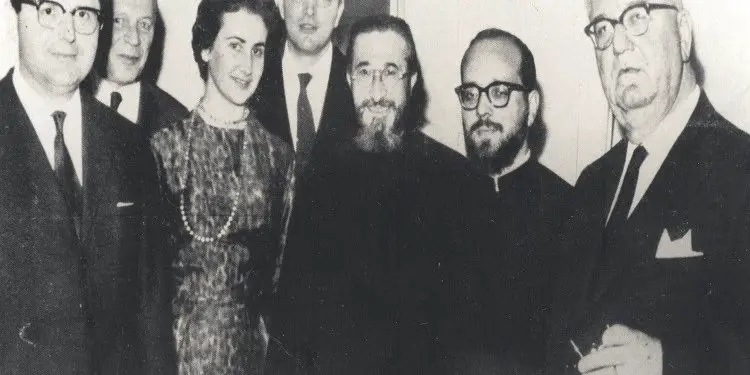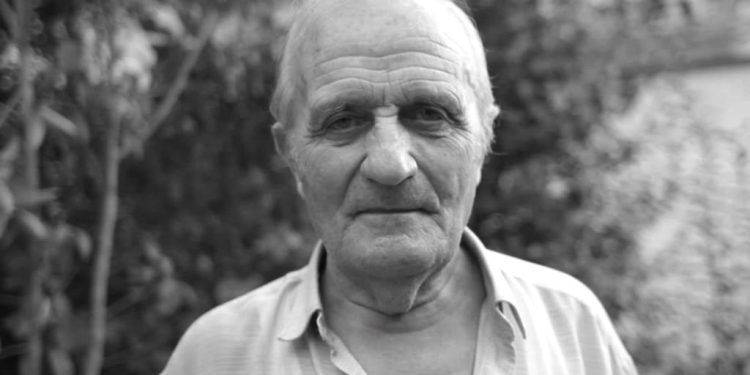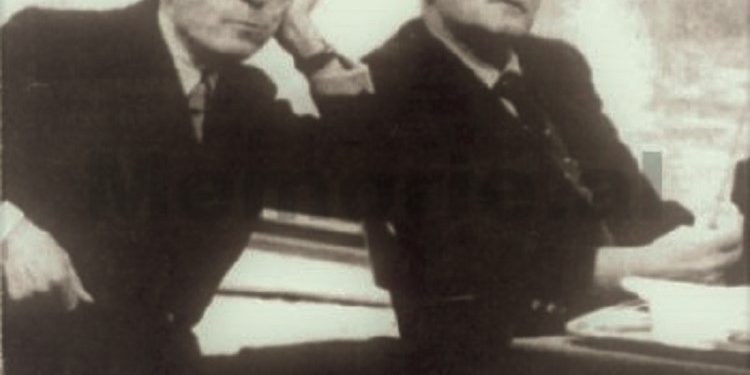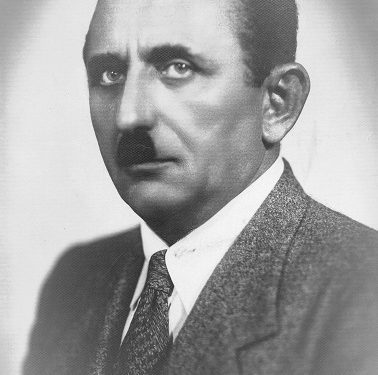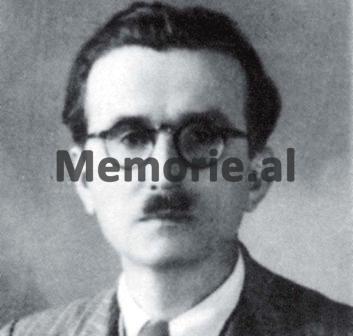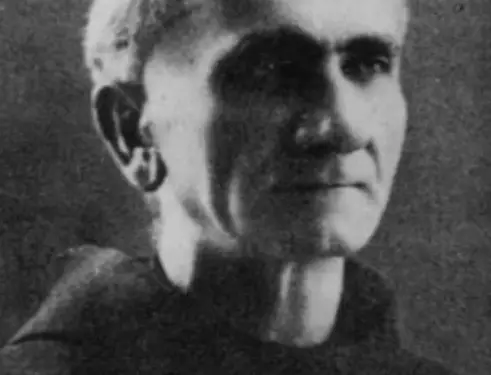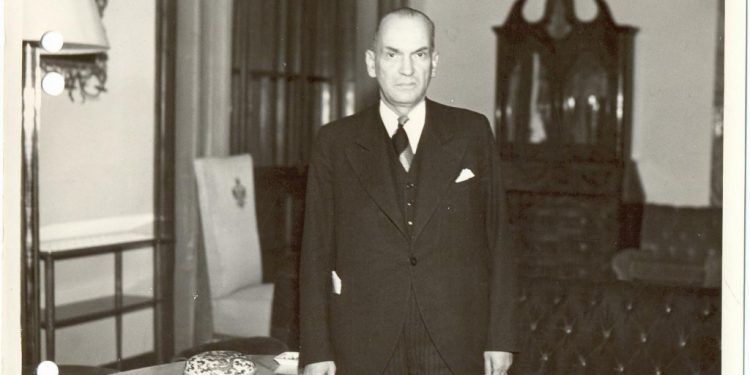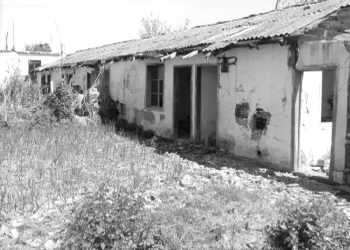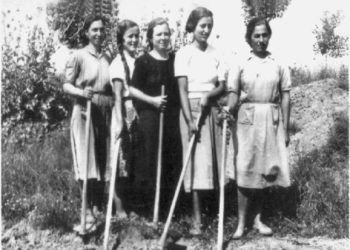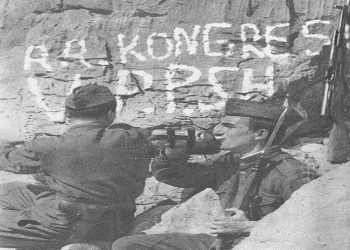By Islam Spahiu
Part Two
-TWO SIDES OF A MEDAL –
Memorie.al / On August 22, 2016, a daily newspaper published a polemic between Mr. Shaqir Vukaj and Mr. Hamza Kazazi, on the occasion of the 73rd anniversary of the Reç War. On this occasion, the first defends the thesis of the Albanian communists, while the second, its opposite. Such a debate would be very useful for Albanian historiography, when we consider that the clash of opinions leads to correct conclusions, but when you see that each side sees only one side of the issue, then here we are dealing with that phenomenon, which in the popular expression is called; “one hits the nail, the other hits the horseshoe”. To avoid this dispute, I am of the opinion that all those who have been eyewitnesses to historical events, and who have arguments and facts that dot the “i”, should participate in this debate.
Continued from the previous issue
HIGH COUNCIL OF REGENCY IN ALBANIA (1943-1944)
It was a high body of power, organized by Albanian nationalists after the capitulation of fascist Italy (1943). The National Assembly elected the High Council, composed of 4 people, who were to preside in turn, for 3 months each. The High Council was the head of state, had the General Command of the Armed Forces, appointed senior officials, issued the necessary decrees and regulations for the implementation of laws. All other attributes that, according to the Zogist status of 1928, belonged to the King, were exercised by the High Council, except for those that did not agree with the character of this institution.
This council was chaired throughout its existence by Mehdi Frashëri. It was therefore an independent Albanian state. The commander of the German armies, through a proclamation, universally declared: “The Albanian people themselves will decide on the political and state future of the country. Germany does not want anything from Albania”! And further: “We Germans are your best and most sincere friends. Do not take us for Italians! Remember that the enlargement of your Albania, with its most fertile regions, you won in 1941, with the help of our weapons”.
And in conclusion: “We, from your Homeland, will leave completely, once the war is over, with our triumph”. – We believe that there is no clearer fact that proves that the German army was not an invader in Albania; its presence in our country was for tactical and strategic purposes, which characterized the Second World War: The danger of the Allied landing on the Adriatic coast had to be stopped. That’s all…!
“LIMBO”, OR THE ALBANIAN “SCHOOL OF ATHENS”?!
A very interesting photograph published by an Albanian daily on August 23, inspires us and gives us the opportunity to highlight and examine the main figures of the Regency (1943), who appear there. Looking at that photograph – magnificent, I would call it – I was reminded of LIMBO from the “Divine Comedy”, where Dante presents the greatest people of antiquity, describing them one by one, according to their glorious names.
And, analogously to this, the famous painting by the brilliant painter of the Italian Renaissance, Raphael, came to mind, where the most glorious figures of antiquity are also presented, this painting entitled; “The School of Athens”. Of course, we cannot stop here, in a detailed analysis, because it is a separate topic, which requires another place and time. But this example serves us, to elaborate the examination of the special figures of our nation who, in terms of historical importance, leave nothing to be desired, the great figures of antiquity, which are presented in Dante’s “Limbo”, or in Raphael’s “The School of Athens”.
So, let us be courageous and take the initiative to shed the light of truth on an anathemaed reality. Let us bring to light those men who shone for a short time, like a candle, which, before completely melting, for a moment emits a spark of greater flame, and then go out. Let us therefore pay tribute to these heroes; those who melted themselves, for the sake of the Fatherland. And, holding in front of us the magnificent photograph, where these brave men worthy of our epic are listed, let us take them in order, from left to right:
Fuat Dibra
Activist of the National Movement for Independence. In 1909, Fuat Dibra was the organizer of the Dibra Assembly, in 1919; he contributed to the expenses of the Albanian delegation’s stay at the Paris Peace Conference, for 17 months. Meanwhile, he himself was a representative of the Albanian Colony of Istanbul at that Conference. On April 5, 1920, together with Pandeli Evangeli, he was a member of the Albanian delegation to the Peace Conference, appointed by the National Council. After the Italian occupation of Albania, he was appointed Minister of the Albanian Economy on December 3, 1941, but he resigned on January 12, 1942.
On April 18, 1942, he was appointed a member of the Supreme Fascist Corporate Council, but Fuat Dibra did not accept that post and did not take the ritual oath, which led to his dismissal on June 9, 1942. In November of that same year, he was one of the founders of the ‘National Front’. On October 25, 1943, the National Assembly convened, where he was elected a member of the Supreme Council. Due to illness, he did not exercise that duty almost at all. He died in Tirana, in February 1944 and was buried with special honors.
Mihal Zallari
He was born in Frashër, Kolonjës, in 1894, into the Zallari family. He attended the German Lyceum in Istanbul; later he completed his studies in Graz, Austria. Meanwhile, his parents’ family, in the years 1920-1924, maintained their political stance, alongside Fan Noli. After returning from his studies, he exercised his capacity and energies in various social or official works.
In addition, he was appointed to the Royal Officers’ School, where he taught the subject of art history. In other schools, he taught the subject of mathematics. He also studied journalism, wrote at a high level in the newspapers “Demokracia”, “Besa”, etc. He continued in the years 1939-1944, writing in the newspapers “Kombi”, “Bashkimi” etc…!
After the capitulation of Italy (September 1943), Mihali was called to the Provisional Committee, which had the attributes of the government, and then to the election of the Assembly that had the functions of Parliament, where he was elected its chairman. He remained in this position until October 1944, and when the German forces were leaving Albania, he was offered the opportunity to be taken to Germany, but he refused.
With the coming to power of the communists, Mihali was among those personalities who were brought before the “Special Court”, accused of being an “enemy of the people”. He was sentenced to 30 years in prison, after a confusing trial. He was released on April 28, 1962, after having served most of his sentence in Burrel prison. He settled in Tirana, where he worked for some time in the capital’s publishing company. Died on March 17, 1976.
Mehdi Frashëri, (1872-1963)
Prime Minister of Albania (1935-1936), senior official in the administration of the Ottoman Empire, and in the Albanian state, political activist. Minister of the Interior in the Government of Durrës (1918), deputy in the first Albanian parliament (1921-1923), Minister of World Affairs (1921), Minister of Agriculture (1930). Representative of Albania in the League of Nations (1934-1937). Chairman of the Council of State (1929), Prime Minister (1935-1936). At this time, his government managed to overcome the crisis in Italian-Albanian relations.
He universally condemned the Italian occupation of our country. The fascists exiled him to Rome. After the capitulation of Italy, the Germans returned him to his homeland and in October 1943, he was appointed head of the Regency. He remained in that post until the end, although the leadership of the Regency was provided for by rotation. At the end of World War II, he left Albania. He wrote a series of historical and political studies, published in various press organs. The most important work is ‘The Ancient History of Albania and the Albanians’. He died in Rome in 1963.
Father Anton Harapi (1888-1946)
Clergyman and political activist. Born in Shiroka, Shkodra. Studied theology and philosophy in Hungary. In 1910, he was a teacher at the College of Brothers (Shkodra), and then served in Malësia e Madhe as a parish priest (1918-1919). In 1925, he published his first book in the field of pedagogy, entitled: ‘Education or the Good Raising of Children’, an adaptation of the principles of world pedagogy for Albanian children. In the years 1921-1924, he participated in political activity. He was one of the leaders of the organization “Ora e Maleve”, and director of the newspaper, with the same name.
He was part of the democratic opposition (1923-1944); he was arrested and imprisoned several times. After the occupation of Albania by fascist Italy, he became a member of the Constituent Assembly (1939). In the years 1941-1943, he took the leadership of the Franciscan Assembly, during the period of German rule (1943-1944), he was elected a member of the Regency Council. After the end of the War, he was arrested and sentenced to death by a “Special Court”, accused of being; “enemy of the people and collaborator of fascism” and was shot. His grave, like that of all others like him, does not exist.
Rexhep Mitrovica (1888-1967)
Activist of the National Movement for Independence, prominent intellectual, prime minister during the period of German occupation. Born in Mitrovica. He headed the ‘Idadie’ high school in Skopje (1916-1920), and studied pedagogical sciences in Vienna. He collaborated in holding the Congress of Manastir and in the implementation of its Latin alphabet.
He participated as a delegate of Peja, in the Assembly of Vlora, which declared independence in 1912 and was one of the signatories of the declaration of independence. He was one of the founders of the National Party (Durrës 1914); member of the “National Defense of Kosovo” Committee; Minister of Education in Albania (24.12.1921-25.02.1924).
Rexhep Mitrovica worked for the nationalization and democratization of the Albanian educational system, for raising the professional level of the Albanian school and helped illegal Albanian education in Kosovo. He supported the ‘Democratic Revolution of June’ 1924 and after its suppression, he left the country. He headed the ‘Paris Group’ of anti-Zogist Albanian exiles.
During World War II, he was a member of the Albanian State Council (1941-1943) and commander of the Albanian volunteer forces in Kosovo (1942-1943). He was arrested and imprisoned by the Italians (1943). With the formation of the Second League of Prizren, he was elected its chairman. He was Prime Minister of Albania in the period 1943-1944. On the eve of the communists coming to power, he left the Homeland. He died in Istanbul (1960).
Vehbi Frashëri
On November 5, 1943, the government was established with Prime Minister Rexhep Mitrovica. The post of Minister of Foreign Affairs was assigned to Mr. Mehmet Konica, while that of Deputy Minister of this ministry was assigned to Mr. Vehbi Frashëri. Mr. Mehmet Konica did not participate in the oath of the new government cabinet and did not exercise this duty until 1944, when Mr. Bahri Omari was appointed Minister of Foreign Affairs.
During this time, Mr. Rexhep Mitrovica, head of the government cabinet, also served as Minister of Foreign Affairs. On July 17, the post of Minister of Foreign Affairs was passed to Mr. Ekrem Vlora.
EPILOGUE
Believing that the above analysis clearly reveals the great truth of our modern history, we will also draw a conclusion. As realists, without illusions, we know that unfortunately the truth is unbelievable; while lies are.
The reason is because the truth does not take into account desire, while lies are built precisely based on it. Except that this phenomenon is temporary: “lies have short legs”. And above all, it turns out that; words have no value, but deeds. “We are: our deeds”! (Jean Paul Sartre).
And if that is so, the personalities we examined above, with deeds and not with words, showed what they were, what sacrifice for the Fatherland was. Such were not only those we presented in “Limbo”, or in “The Albanian School of Athens”. There were other giants like them; only their name is their glory.
Here we are dealing, for example, with a giant of Albanian literature, Ernest Koliqi, without rival in the genre of the Albanian novel; that is, a peak that some “court” writers could not reach. And this apogee of patriotism and culture, used talent combined with European state power, to bring, as they say, water to the national mill; and he achieved it brilliantly.
Ernest Koliqi. As Minister of Education, he sent 200 of the most qualified teachers to the lands of liberated Albania, such as; Kosovo, Macedonia and Montenegro. Today’s Kosovo owes a lot to him; he made it “speak Albanian”. “And that most beautiful palace has hidden in the ground the stones on which it was supported and grew” (Konica).
Sadly, in general, today’s Kosovars still do not know this; It is sad to see some of them come and lay wreaths on the grave of the dictator Enver Hoxha, precisely the one who perpetuated foreign rule over them. But we always believe that the day will come when they will recognize their true saviors.
They will erect monuments and statues; they will name their most beautiful squares and streets after them. Alongside Kolic, we have another giant: the “quisling” prime minister, Mustafa Kruja. He also combined great cultural talent, as an unparalleled linguist, with the most ardent patriotism. He had the courage to remove the “lictor’s bandages” placed by the invaders from our national flag.
This did not happen with the Italian flag; Mussolini did not react at all. Another case concerns the famous Albanologist of Jewish origin, Norbert Jokli. The Nazi regime, in one of the main points of the program, had the extermination of Jews. In this case, Jokli was arrested and would be sent to concentration camps.
As soon as he heard the news, Prime Minister Mustafa Kruja, personally addressed Adolf Hitler by radiogram, asking for Jokli’s forgiveness, for the sake of the Albanian people, to whom he had served so much. To everyone’s surprise, Hitler ordered his release, but unfortunately, he had passed away (he jumped from a train), a few minutes earlier.
There are other great figures, which have not been lacking in Albania, which it is not enough to mention, as we are doing here; monographs from dignified pens are needed. And so, to conclude, ‘Limbo’ and ‘Shkolla Athina Shqiptare’, other spaces will be added, until the National Pantheon, which the Homeland owes them, is built and erected. Memorie.al




